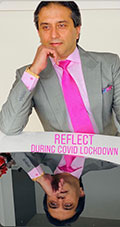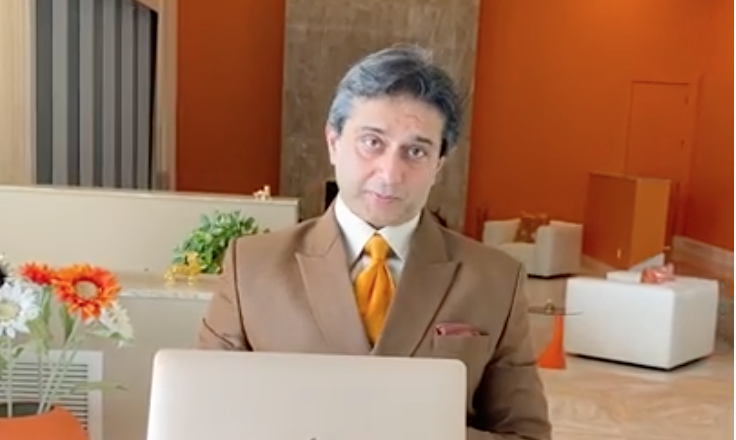
Corona Virus Pandemic: Part I
Understanding the disease

These are unprecedented times for the entire world. A human tragedy of untold proportions has just unfolded right in front of our eyes. A pandemic called Covid -19 produced by SARS-Cov2 (corona) virus that originated in Wuhan, China and first detected in December 2019 has spread to all the countries and has turned the world topsy-turvy. The number of cases and deaths from the disease has grown exponentially. If you have been following the headlines during the past few weeks, you already know the devastation brought on by this virus. The total number of cases in the world, as of this writing, is nearing the 5 million mark with deaths over 320,000. Unfortunately, USA stands now as the worst affected country in the world with cases over 1.5 million and deaths about 93,000 and still rising. In spite of having better facilities to treat these patients, we haven’t been able to cut down the death rate significantly.
This virus has beaten us every step of the way but we are beginning to understand its protean manifestations better as more research studies and autopsy results are coming in. Initially, we thought it was primarily a respiratory virus since it presented with cough, fever and pneumonia. Now we know, the virus, a virulent one, after entering the body through upper respiratory passages, shows its real nature as a ‘vasculotropic’ virus producing severe inflammation of the ‘vascular endothelium.’ This in turn causes ‘disseminated intravascular coagulation,’ the end result being occurrence of widespread blood clots leading to consolidation of the lungs, heart attacks, strokes, heart failure, kidney failure and more – the end result being higher death rate. And the latest is a type of severe generalized inflammation in children and young adults resembling Kawasaki’s disease with a high mortality rate.
After a period of national shutdown’ and stay-at-home orders, many states are opening up and easing restrictions, which could trigger a new wave of the outbreak. Hence, we have to use extreme caution and judgment. This is the time for all of us to remain calm and united and help one another to tide over the crisis. Since the pandemic is anything but abated and is unlikely to leave us any time soon, we will need to strictly adhere to the prevention strategies laid out by the experts for long-term success: the entire social distancing package, personal hygiene techniques including proper hand washing as and when needed, wearing well-fitting masks and avoiding contacts with others as much as possible. As you already know the older population with preexisting heart disease, hypertension and suppressed immunity from whatever reason – are more vulnerable.
The most worrisome aspect is the statement from the leading U.S. infectious disease expert Dr. Anthony Fauci: “The corona virus outbreak the world is experiencing now may become a cyclical occurrence and could return even stronger if proper precautions are not taken.” Which means you can expect it to come back in the winter months, a scary thought indeed. And cases are beginning to appear in the regions previously not affected by the pandemic like South American and African nations! Let us not forget the history lesson we learned from the most severe pandemic in history, the Spanish Flu of 1918: “It lasted for two years, came in three waves, with 500 million people infected and 50 million deaths. Most of the fatalities happened in the second wave! The people felt so bad about social distancing and quarantine measures that when they were first lifted, the people rejoiced in the streets with abandon. In the coming weeks, the second wave occurred, with tens of millions dead.”
So, the take-home message is, “We are in it for the long haul. And let’s not repeat history in the time of Covid-19.” Now we are better equipped to deal with the disease, having the knowledge of how the virus spreads and how to prevent its transmission. Hopefully, a vaccine will be available soon. Finally, everybody should know the ways to boost one’s own immune system that will reduce the risk for viruses and other pathogens.
To be continued …
M.P. Ravindra Nathan, M.D., is a cardiologist and Emeritus Editor of AAPI Journal. For further reading, “Second Chance - A Sister’s Act of Love” by Dr. Nathan from Outskirts Press, can be found at www.amazon.com
Eye Care
Look In when Locked In: Time to Reflect!

In these unprecedented times, we can surely despair, and yet we can prepare to spring forward.
My conceptual teaching for eye surgeons in training is, “How we react to pressure determines whether we become diamonds or crumble like charcoal. Hence, look at every difficult time as a polisher: Let it rub you the right way so we end up sparkling even more.”
These unprecedented times remind me of the recent global nightmare we faced when our ocean-front home was struck twice, by hurricanes Matthew and Irma, and became a time of personal tragedy, perceived helplessness, and I got into the ‘Why me?’ mode.”
While in this personally fragile mode, I was approached by a private equity firm that wanted to buy my practice for an eight-figure sum – to include relocating me to Malibu as an exclusive surgeon to movie stars and celebrities.
I went into my ‘locked-down-look-in’ mode and asked myself, “What drove me? Was it money? Would it be geography – in this case, Malibu?” And my answer was no! I loved what I did every day and it made the world fly to my location. I am addicted to my patients’ surgical outcomes and love treating them like family. So, I refused the attractive private equity offer and to ensure that my wavering mind ‘got the message,’ while facing staggering expenses for home repair, I invested everything I could and built the world’s first cataract spa in Jacksonville.
My mind got the message! And I changed my attitude from ‘Why me?” to ‘Try me!’”
While we have been ‘locked down’ in our houses, may I encourage you to ‘look in, and lock yourself down in your conscience for a while. Get inside, stay there and look at you. You’re you, and you don’t have to wear any paraphernalia.’
Use this time for personal reflection — to think about the areas of your life that you enjoy, that you don’t enjoy things that are working well for you, and things needing improvement. It’s a rare circumstance indeed that so many people have had to stop and think deeply about their lives. How often do people have the chance to get off of the hamster wheel of routine and hard work?
It’s a good time to ask yourself important questions. “Are you happy? Are you doing what you want? As a doctor, is your practice going the way you would like? If not, what can you do to change it?” Self-reflection gives people an opportunity to look into the metaphorical mirror and conduct a mental and emotional check-in.
Most notably, I encourage doctors to recall why they became a doctor. Is it your dream to have ‘waiting’ rooms packed with delayed, complaining patients who came in following expensive advertisements, and then hurtling them through cookie-cutter surgery mills with constant fear of repercussions? Is it right that so many doctors are constantly anxious about their external environment, envious of colleagues, and then waiting for 5 p.m. to get out of their offices?
My metric for a doctor’s success is simple: If a patient’s life is improved, then the doctor has done their job. “Think about it. If you’re a surgeon and none of your postoperative patients are calling you with any complaints during this lockdown time – that means you’ve done an amazing job. Your patients are healed! You should be happy.”
Your patient decides your success, not you and that is the highest accountability of success, not engineered statistical charts. My worldwide patients (some of the most demanding personalities in the world) are on Facebook (with no incentive) sharing their stories. That surely is for hope to similar patients but I use that as my gauge to success. It keeps me in check.
Authenticity is the most important factor. Patients appreciate a personal touch and being treated as humans rather than as simply a source of income for a doctor. You have to have the persona and the heart, not just the look. Patients will come to see you because they like you personally.
I respect members of the medical community, especially those dealing with COVID-19. People often say that doctors are on the front line. Who else could stay up for 72 hours in high-stress situations and still appear professional and capable to perform complicated eye-hand coordinated surgical procedures? Doctors are rock stars!
To doctors, I say, you were among the smartest in your class at college; hence, you achieved a medical seat. Then among these intelligent medicos, you were so smart that you achieved the very coveted ophthalmology residency. So, why are you anxious and worried? There is nothing you cannot do.
When it comes to ophthalmologists, I believe we must realize how specially privileged we are. We can use our fingers on a 3-centimeter eyeball and change a patient’s life while they are breathing. How amazing is that?
To be continued …
Arun C. Gulani, M.D., M.S., is director and chief surgeon of Gulani Vision Institute in Jacksonville. He can be reached at [email protected] or visit www.gulanivision.com
EYE Health AND Covid-19
Click below to watch Dr. Arun Gulani speak:
I'm going to talk to you about your eye health during this COVID-19 lockdown. Having given a number of media interviews nationally and internationally on my take on eye care during COVID-19, I wanted to share with you how we need to not only protect our eyes, but also prevent any infection as a route to Covid19.
I have broken this down into four parts.
And the first one I'm going to start with is computer hygiene. We are all aware of this, but maybe we are forgetting it. Just because of the amount of time we have now staring at screens and computers. So the first thing about computer hygiene is to make sure that the screen is at eye level, and then the 90-90-90 rule involving positioning of your elbows, knees and spine with feet relative to your working space and setup.
So everything is in sync, especially the position of your spine, which is not causing any strain on your body, but the long hours that you might be on the computer, then the 20-20-20 rule is every 20 minutes, break away for 20 seconds and look at something 20 feet away that rest your eyes and the muscles and helps them to recover normalcy to your vision.
The computers screens besides the strain that it causes on your vision, especially because you're staring at your cell phone for the news and you always have it held low, you are actually using one of the heaviest parts of your body, your head, which is balanced on a very delicate cervical spine here.
You're making the head all the time in the position of gravity, which is very difficult for your cervical spine. This will lead to strains and headaches and the muscles also start stiffening and long term you may impacted to have cervical spine damage. Again, very important to exercise. You have all the time in the morning to excite your body.
Try and look up or keep your cell phones up for the brief period that you're looking at it. Besides that, do remember computer screens themselves are back lit, human eyes were not made for backlit screens. You were made for direct, natural light coming from behind us. The backlit lights of the screen can hurt our eyes.
Your vision. So many patients complain of blurry vision or dryness. They even feel they're losing vision and all of these are part of what we call computer vision syndrome. My kids because they're home from medical school and high school, they ordered these computer glasses that you can wear and you can protect your eyes to some extent.
And these are available online. You guys can go and look for it. And that's one thing. But first, decrease your child’s time on the screens. Remember, these screens actually have pixels that are moving fast and our eyes are trying to accommodate to it and see. And another important thing to remember is that when people stare at a computer, they forget to blink.
So their eyes are open all the time and the tears evaporate because the lids are not coming down like windshield wipers to replenish the tears. So all these symptoms of pain, headache, blurry vision, dryness are part of computer vision syndrome, but follow this hygiene principle and you'll be fine but do decrease your time on computers.
I know it’s fun and it's information, but I myself am guilty. Like I said, I've been teaching three to four webinars a day to thousands of eye surgeons from all over the world and we get stuck to our computer.
Prevent and Protect: Please make sure we're following our social distancing, not stepping out of the house unless it is an urgency or emergency. If I even step out without going outside the house, I wear these special wraparound sunglasses that I modified so I cannot hurt myself and yet protect from ocular transmission.
You can wear anything, even your regular sunglasses as it is protecting your eyes. Why is that important? Because we know of the three ways the Corona virus can infect humans is mouth, nose, and eyes. So if you protect your eyes, you're making sure that that's one barrier. The second important thing is if you are clinically infected and your tears are carrying the virus, you're not exposing other people so easily to this.
General guidelines: Of course you're wearing masks and following all precautions from your local officers. So, I hope this was helpful for you. And in summary, we covered computer hygiene, which is very important given that we are excessively using our computers and iPhones and iPads and screen time. We also covered ocular hygiene, which is how to protect your eyes and also prevent any infection.
We also talked about the symptoms of computer vision syndrome so you can understand that this could be natural to you based on what you're doing as opposed to an infection.
You may still contact your eye doctor if you have any questions.
As we slowly and carefully start reopening, let’s ensure safety first
You are welcome to follow me on Instagram, YouTube, Facebook, or send any of your questions to [email protected]
